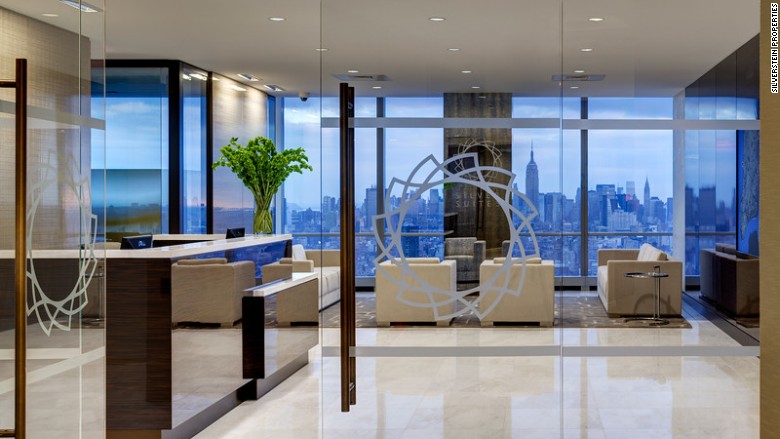Sara Ashley O’Brien CNN
While most young entrepreneurs hole up in co-working spaces, a few lucky ones are running their firms out of 7 World Trade Center — for free.
It’s just one of the perks for startups working with SilverTech Ventures, a four-month-old firm that collaborates with Silverstein Properties, the major Manhattan real estate developer.

SilverTech participants have the option to upgrade their offices by paying rent at Silver Suites, on the 46th floor. Photo CNN
“I call it an accelerator with an unfair advantage,” said venture capitalist Charlie Federman, who co-founded SilverTech Ventures with fellow VC Lawrence Wagenberg, and Silverstein Properties President Tal Kerret.
The most “tangible” contribution is free real estate. But SilverTech also offers business advice, access to its network of entrepreneurs and investors, and roundtables with key people in tech.
SilverTech is an accelerator without a built-in timetable. Unlike many accelerators, SilverTech doesn’t operate on a cohort system, so there’s no set time that it brings startups on board and no end to the relationship.
According to Federman, entrepreneurs often need to shift or “pivot” their product. SilverTech embraces this, and Federman says they have the conversation upfront.
“We’ll work with them as they meander right and left. We give them the gift of time,” said Federman, who has been investing in startups since 1998.
It is a venture capital firm — but it doesn’t take large amounts of equity. Federman said SilverTech’s equity is “generally in the single digit percentages” and varies depending on the company.
“We’re not really interested in control and board seats … we find that we’re probably most effective if we don’t have that,” he said.
SilverTech also takes in some startups for no equity. Graduates of Cornell Technion’s Runway program — a post-doc accelerator for tech entrepreneurs — get the option to participate in SilverTech for up to one year after graduation.
“They’ll get all the benefits,” said Federman. “All I ask in return is that they try to build a great company.”
Federman said the benefit for SilverTech is exposure to talented entrepreneurs and their innovative ideas. Currently, two of the four startups in SilverTech are from Runway.
It’s a co-working space — but doesn’t charge rent. SilverTech offers up free space on the 10th floor of the esteemed 7 World Trade Center, the first building to open post-9/11. The floor can fit 30 people comfortably (about 10 to 15 startups). By August, SilverTech will move to 4 World Trade Center, which will fit up to three times the number of people.
It’s not the real estate developer’s first time working with startups. Two years ago, Silverstein Properies opened up the 46th floor of 7 World Trade Center to young companies. But the roughly 40 firms that work there pay for space — anywhere from $450 to $950 per seat. Unlike with SilverTech, there’s no equity or hands-on counsel.
SilverTech participants have the option to upgrade their offices by paying rent at Silver Suites, on the 46th floor.
Kerret was once in the shoes of those he’s now helping. Prior to Silverstein, he founded two successful startups: e-commerce firm RichFX and gaming provider Oberon Media.
“I think what they’re doing is a good move, both financially and philanthropically. They believe in New York as a startup hub. They’re taking their stake in it,” said Roi Klipper, founder of e-commerce startup City Hive, which grew out of the Runway program and is now part of SilverTech.
“Offering more of the same isn’t going to cut it,” he added.
SilverTech plans to work with entrepreneurs across different industries — not just real estate — and at different stages in their growth.
Crowdfunding real estate firm Fundrise has raised $35 million, while LiquidTalent, a marketplace that helps contract workers find jobs, has raised just $650,000.
For LiquidTalent, the free rent is key.
“It allows us to invest in the technology, the team. We’re able to allocate resources more efficiently,” said founder Alex Abelin. “Not having to pay rent really helps low burn rate.”
He’s no stranger to cool office digs — he worked at Google for eight years — but he knows that an entrepreneur’s lifestyle isn’t always so posh.
“We were working from home and cafes when we started,” he said. “Having clients come to this building, it looks and feels a lot better. We feel more grown up, more professional. It’s not just a project, it’s a company. It really legitimizes [the business] when you have [a] World Trade Center address.”

